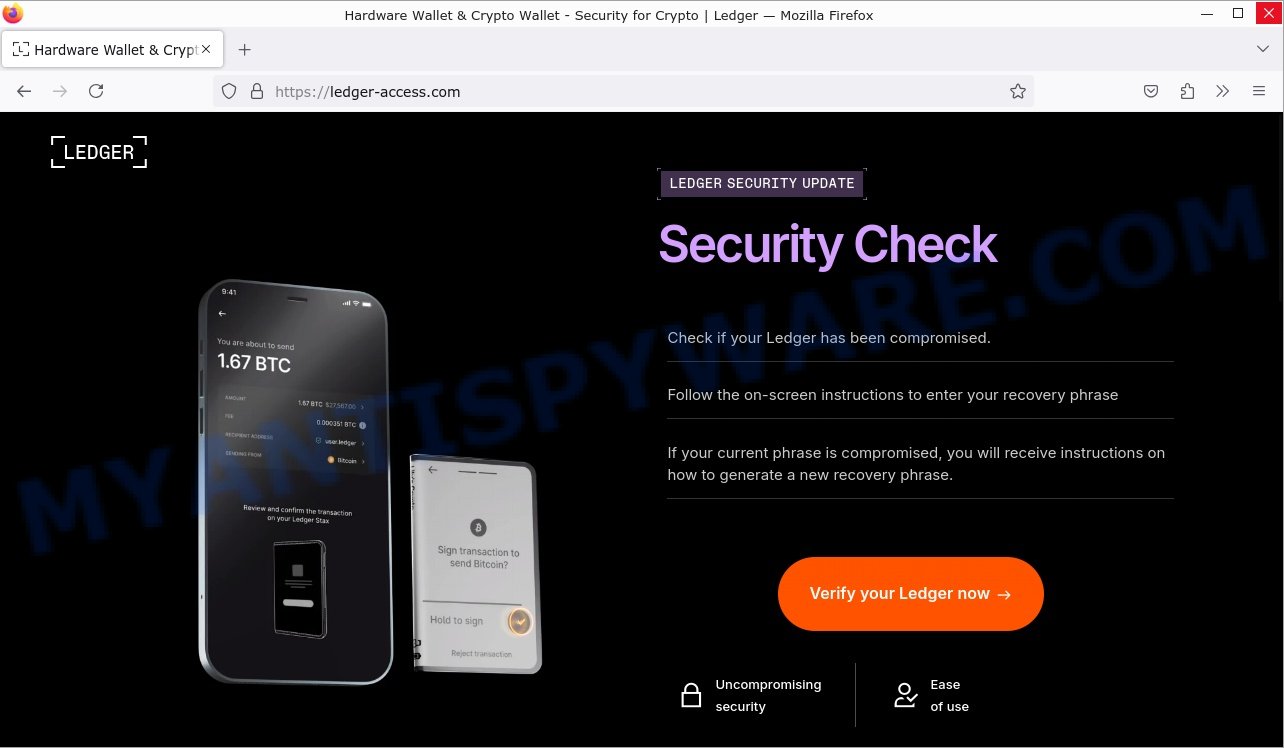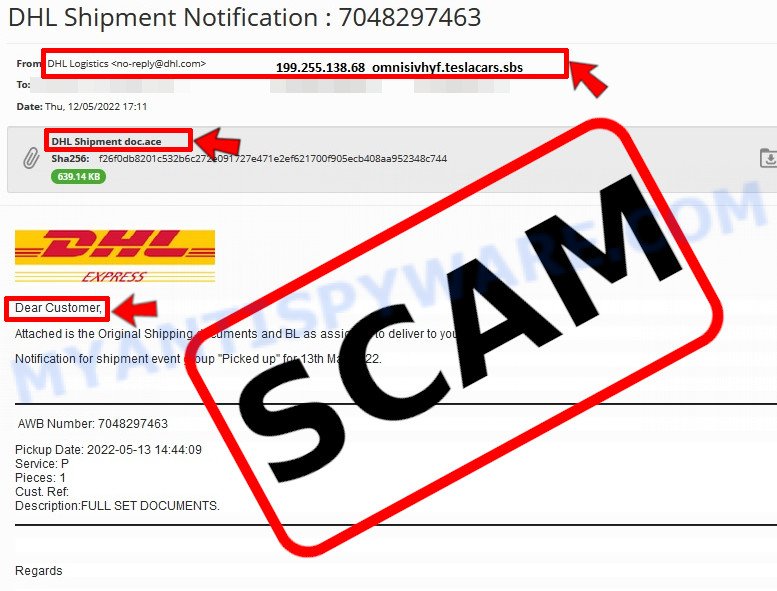The Myantispyware team wants to warn you about a sneaky scam targeting Ledger users. This scam involves a fake email claiming there’s been a data breach at Ledger. The email urges you to verify your recovery phrase to keep your assets safe. But don’t be fooled. This is a phishing scam designed to trick you into giving away your sensitive information.
The scam email pretends to be from Ledger and even includes a button that says “Verify My Recovery Phrase”. If you click it, you’re taken to a fake website that looks like Ledger’s official site but isn’t. It’s a phishing site with the address ledger-access.com set up to steal your recovery phrase. Once the scammers have your recovery phrase, they can access your funds and take them.


A typical “Ledger Recovery Phrase Verification” scam email reads as follows:
Subject Action Required: Ledger Data Breach – Check Your Recovery Phrase
LEDGER
Verify the Security of Your Recovery Phrase
Hello,
We want to inform you of a recent data breach affecting our service. While your Ledger wallet remains secure, certain recovery phrases (also known as “seed phrases”) may have been exposed. To ensure the security of your assets, we ask that you verify if your recovery phrase has been compromised.
Steps to Verify Your Recovery Phrase Security:
1. Visit our official verification page.
2. Enter your recovery phrase following the on-screen instructions.
3. If your current phrase is compromised, you will receive instructions on how to generate a new recovery phrase.
If you have any questions or need assistance, our support team is here to help. Click the button below to go directly to the verification
page:
Verify My Recovery Phrase
Summary Table
| Name | Ledger Recovery Phrase Verification Email Scam |
| Type | Email Phishing |
| Affected Platform | Ledger Wallet Users |
| Scam Method | Email claiming data breach, leading to a phishing website |
| Phishing Page URL | ledger-access.com |
 What to Do When You Receive the “Ledger Recovery Phrase Verification” Scam Email
What to Do When You Receive the “Ledger Recovery Phrase Verification” Scam Email
We advise everyone who receives this email to follow the simple steps below to protect yourself from potential scams:
Do not believe this email.
NEVER share your personal information and login credentials.
Do not open unverified email attachments.
If there’s a link in the scam email, do not click it.
Do not enter your login credentials before examining the URL.
Report the scam email to the FTC at www.ftc.gov.
If you accidentally click a phishing link or button in the “Ledger Recovery Phrase Verification” Email, suspect that your computer is infected with malware, or simply want to scan your computer for threats, use one of the free malware removal tools. Additionally, consider taking the following steps:
Change your passwords: Update passwords for your email, banking, and other important accounts.
Enable two-factor authentication (2FA): Add an extra layer of security to your accounts.
Contact your financial institutions: Inform them of any suspicious activity.
Monitor your accounts: Keep an eye on your bank statements and credit reports for any unusual activity.
 How to Spot a Phishing Email
How to Spot a Phishing Email
Phishing emails often share common characteristics; they are designed to trick victims into clicking on a phishing link or opening a malicious attachment. By recognizing these signs, you can detect phishing emails and prevent identity theft:

 Here Are Some Ways to Recognize a Phishing Email
Here Are Some Ways to Recognize a Phishing Email
Inconsistencies in Email Addresses: The most obvious way to spot a scam email is by finding inconsistencies in email addresses and domain names. If the email claims to be from a reputable company, like Amazon or PayPal, but is sent from a public email domain such as “gmail.com”, it’s probably a scam.
Misspelled Domain Names: Look carefully for any subtle misspellings in the domain name, such as “arnazon.com” where the “m” is replaced by “rn,” or “paypa1.com,” where the “l” is replaced by “1.” These are common tricks used by scammers.
Generic Greetings: If the email starts with a generic “Dear Customer”, “Dear Sir”, or “Dear Madam”, it may not be from your actual shopping site or bank.
Suspicious Links: If you suspect an email may be a scam, do not click on any links. Instead, hover over the link without clicking to see the actual URL in a small popup. This works for both image links and text links.
Unexpected Attachments: Email attachments should always be verified before opening. Scan any attachments for viruses, especially if they have unfamiliar extensions or are commonly associated with malware (e.g., .zip, .exe, .scr).
Sense of Urgency: Creating a false sense of urgency is a common tactic in phishing emails. Be wary of emails that claim you must act immediately by calling, opening an attachment, or clicking a link.
Spelling and Grammar Errors: Many phishing emails contain spelling mistakes or grammatical errors. Professional companies usually proofread their communications carefully.
Requests for Sensitive Information: Legitimate organizations typically do not ask for sensitive information (like passwords or Social Security numbers) via email.
 Conclusion
Conclusion
We hope this article has helped you understand more about the “Ledger Recovery Phrase Verification” Scam Email and how to avoid falling victim to scammers. If you have received a phishing email that is similar but not identical to the example above, please post it in the comments section of this article. This helps us warn other users about potential scams and improve our resources to protect you better. Stay safe and vigilant!

















